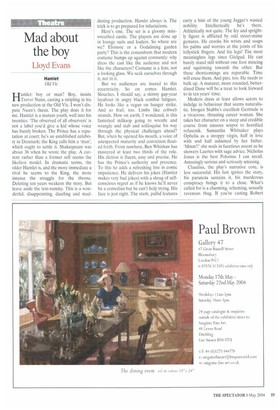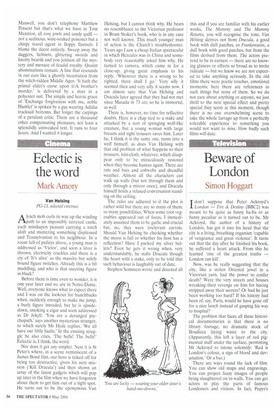Mad about the boy
Lloyd Evans
Hamlet Old Vie
Hamlet: boy or man? Boy, insists Trevor Nunn, casting a stripling in his new production at the Old Vic. I won't dispute Nunn's thesis. The play does it for me. Hamlet is a mature youth, well into his twenties. 'The observed of all observers' is not a label you'd give a kid whose voice has barely broken. The Prince has a reputation at court; he's an established celebrity in Denmark; the King calls him a 'man', which ought to settle it. Shakespeare was about 36 when he wrote the play. A current rather than a former self seems the likeliest model. In dramatic terms, the older Hamlet is, and the more immediate a rival he seems to the King, the more intense the struggle for the throne. Deleting ten years weakens the story. But leave aside the text-rummy. This is a wonderful, disappointing, dazzling and mad
dening production. Hamlet always is. The trick is to go prepared for infuriations.
Here's one. The set is a gloomy mistwreathed castle. The players are done up in lounge suits and loafers. So where are we? Elsinore or a Godalming garden party? This is the conundrum that modern costume bumps up against constantly: why dress the cast like the audience and not like the characters? Costume is a lens, not a looking glass. We seek ourselves through it, not in it.
But we audiences are inured to this eccentricity. So on comes Hamlet. Slouches. I should say, a skinny gap-year layabout in angry black combat fatigues. He looks like a vegan on hunger strike. And so frail, too. Limbs like cobweb strands. How on earth, I wondered, is this famished milksop going to wrestle and wrangle and stab and soliloquise his way through the physical challenges ahead? But, when he opened his mouth, a voice of unexpected maturity and conviction floated forth. From nowhere, Ben Whishaw has mastered at least two thirds of the role. His diction is fluent, easy and precise. He has the Prince's authority and presence. To this he adds a refreshing line in comic impatience. He delivers his jokes (Hamlet makes very bad jokes) with a shrug of selfconscious regret as if he knows he'll never be a comedian but he can't help trying. His face is just right. The stark, pallid features carry a hint of the young Jagger's wasted nobility. Intellectually he's there. Athletically not quite. The fey and sprightly figure is afflicted by odd street-mime gestures. He crooks his wrists and soaps his palms and worries at the joints of his lollystick fingers. And his legs! The most meaningless legs since Gielgud. He can barely stand still without one foot mincing and squirming towards the other. But these shortcomings are reparable. Time will erase them. And pies. too. He needs to bulk up. A maturer, more rounded, betterdined Dane will be a treat to look forward to in ten years' time.
Modern dress at least allows actors to indulge in behaviour that seems naturalistic. Imogen Stubbs's excellent Gertrude is a vivacious, thrusting career woman. She takes her character on a steep and credible course from sinuous sexpot to horrified refusenik. Samantha Whittaker plays Ophelia as a stroppy virgin, half in love with and half ashamed by her father. `Mmm!!' she nods in facetious assent as he showers Laertes with sage advice. Nicholas Jones is the best Polonius I can recall. Amusingly serious and seriously amusing.
Claudius, the play's narrative core, is less successful. His lust ignites the story, his paranoia sustains it, his murderous conspiracy brings it to a close, What's called for is a charming, scheming, sexually ravenous thug. If you're casting Robert Maxwell, you don't telephone Matthew Pinsent but that's what we have in Tom Mannion, all rosy jowls and sandy quiff — not a seditious, wine-soaked poisoner but a chirpy travel agent in floppy flannels. I blame the decor entirely. Sweep away the daggers, helmets, glittering swords and knotty beards and you jettison all the mystery and menace of feudal royalty. Quaint abominations remain. A line that resounds in our ears like a ghostly incantation from the witch-ridden Middle Ages: 'It hath the primal elder's curse upon it/A brother's murder,' is delivered by a man in a polyester suit. The simple and heroic grace of 'Exchange forgiveness with me, noble Hamlet' is spoken by a guy wearing Adidas tracksuit bottoms. But forget the carpings of a petulant critic. There are a thousand other compensating pleasures, not least a splendidly untweaked text. It runs to four hours. And I wanted it longer.













































































 Previous page
Previous page